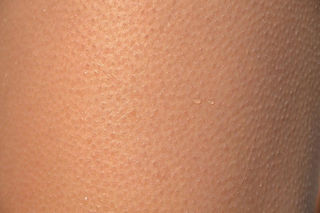Orgasm
Have You Ever Had a “Skin Orgasm”?
These ephemeral sensations say something about your personality—and your brain.
Posted February 11, 2020 Reviewed by Davia Sills

Have you ever heard soaring music or a heart-wrenching story and felt a rush of tingles over the surface of your body?
If so, you've experienced a phenomenon called frisson. Pronounced "free-sawn," the term comes from a French word meaning "to shiver." In English, frisson refers to the sensation you get when a piece of art—like a song, a film, or a book—moves you so deeply that it elicits a physical reaction.
It's still a mystery why some of us feel frisson, and others don't, but researchers are discovering that the people who experience this sensation the most powerfully have character traits and neurological wiring that set them apart.
Other names for frisson
You might have heard frisson called "chills" or "thrills," but most researchers avoid those terms because chills are so strongly associated with negative experiences and thrills with positive ones. Frisson, on the other hand, can occur in response to a wide variety of art, regardless of whether it's happy or sad, positive or negative.
"Skin orgasm" is the most colorful, but possibly also the most accurate, name for the phenomenon. Some people describe the experience as waves of pleasure coursing over the skin, and, like an orgasm, it's an involuntary physical reaction.
In a paper published in the journal Frontiers in Psychology, music psychologists Psyche Loui and Luke Harrison write that the term "skin orgasm" helpfully suggests "a pleasurable sensation that is paradoxically both universal and variable." This name isn't often used in research, though, because its link with sex has the potential to confuse or bias participants in scientific studies.
Experiences that cause frisson
In music, the features that most commonly induce frisson are ones that violate our expectations, like crescendos, the onset of unexpected harmonies, the entrance of a human voice, or affecting lyrics. This surprise factor, combined with one of the loftiest and heartbreaking songs in the history of musical theater, is why so many people experience chills watching Susan Boyle's audition on "America's Got Talent":
For more frisson-inducing music, check out: 10 Songs That Will Give You Chills
Sensory stimulation other than music can bring about frisson, too, including various sounds (like fingernails on a chalkboard), sights (like pictures of puppies), tastes (like the tartness of lemon), and touches (like a head massage). It's even possible to feel a burst of tingles just from imagining a past experience, with no real-time stimulation at all.
In stories—whether they're on film, in print, or told aloud—we tend to get chills from selfless actions, moments of quiet contemplation, reflections on the meaning of life, expressions of solidarity, and violent separations.
What does frisson feel like?
Fundamentally, frisson is an emotional or aesthetic response so powerful that it triggers a physical reaction. It's a moment of ecstasy, of being transported by an experience.

Tingles along the surface of your skin or a chill traveling up your spine are the sensations most often associated with frisson. Some researchers group other strong physical reactions that don't involve the skin—like a lump in the throat, tears welling up, and muscle tension or relaxation—under the umbrella of frisson as well.
One of the most consistent features of frisson is that it feels great even when it's brought on by an unpleasant stimulus, like a scary movie or a sad song. But how can something bad make us feel good? One likely explanation is a hedonic reversal or benign masochism. When you know you're safe, you can enjoy an experience that would normally be frightening or upsetting—you can reverse the feelings associated with the event.
Take the example of watching a scary movie. Your body winds itself up as though you're the one under threat rather than the characters in the film. Since you're aware that you're actually just in a movie theater or your living room, though, you can relax and take pleasure in the rush of adrenaline, endorphins, and frisson that course through your body in answer to the on-screen dangers. One recent study showed that when people experience frisson from real-life situations, it's likewise in circumstances where they feel secure and trust the environment.

What's happening in the body during frisson
Frisson may be a personal and subjective experience, but that doesn't mean it isn't real. Scientists have recorded measurable physiological changes in people who are experiencing frissons, such as increased skin conductance and, sometimes, a rise in heart rate or goosebumps.
During frisson, activity spikes in the brain's reward centers, the same areas that are stimulated by worldly pleasures like food, sex, and recreational drugs, and they release dopamine, often called the feel-good neurochemical. What's amazing about this is that human beings are able to obtain the same type of enjoyment from art as we do from fulfilling our most basic biological needs, even though it gives us no obvious survival advantage.
What feeling frisson says about you and your brain
One of the most interesting features of frisson is that not everyone feels it. It's not clear exactly what percentage of the population does—researchers put the figure at anywhere from 55 to 86 percent—but even those who experience frisson do so with varying degrees of intensity.
Studies conducted in the past few years have shown that people who get strong sensations of frisson have specific neurological and personality traits. Researchers at Harvard scanned the brains of 10 subjects who experienced powerful frisson and compared them with the brains of 10 people who experience none at all. They discovered that the brains of the frisson group had a much higher volume of connections between the auditory cortex, where sound is processed, and the areas of the brain responsible for reward and emotions.

Individuals who get frisson also share a common personality trait: Openness to Experience. According to music psychologist Mitchell Colver, "people who possess this trait have unusually active imaginations, appreciate beauty and nature, seek out new experiences, often reflect deeply on their feelings, and love variety in life."
Colver's research suggests that frisson may have less to do with the depth of emotion someone is feeling in the moment and more to do with how much they are immersed in an artistic experience. He writes that "making mental predictions about how the music is going to unfold or engaging in musical imagery (a way of processing music that combines listening with daydreaming)... are associated with frisson to a greater degree than the emotional components."
Frisson is a heightened version of the enjoyment all human beings are able to derive from art, and Colver's work suggests one way you might be able to cultivate your own ability to experience this pleasurable sensation: Instead of just letting the music flow over you, try concentrating on it. Put on your headphones, close your eyes, and you, too, might feel a delightful chill creeping up your spine.
Facebook iamge: Stock-Asso/Shutterstock




